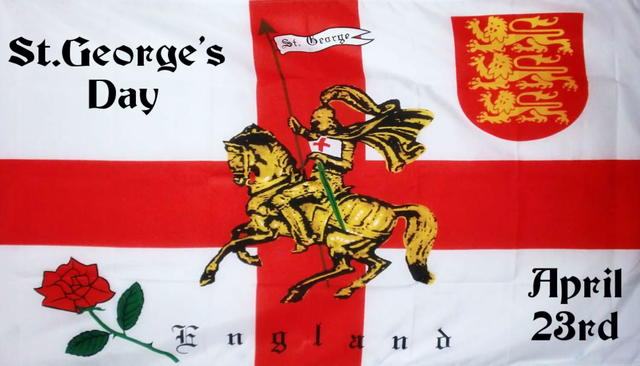On April 23, it is the day that England celebrates the day in honor of its patron Saint George (Saint George).
Although that day is not a holiday (all businesses, schools and transport operate normally) in recent years voices have been raised to do so, such as the deputy Andrew Rosindell, who requested before the House of Commons that Saint George was festive, or that of the mayor of London, Boris Johnson, who led a campaign to encourage the celebration of the day.
However, calls have also been made to replace St. George as patron of England, arguing that he was a dark figure who had no direct relationship with the country. Even so, there is no clear consensus on who would replace him, although the names of Edmund the Martyr, Cuthbert de Lindisfarne or Saint Alban are shuffled.
How do the English celebrate the day in honor of their employer?
To start many English that day they like to show their flag, so you will not get tired of seeing people with the England shirt or with the flag hanging or decorating bars, houses and cars.
Although increasingly disused, a custom of the English is to wear a red rose on the lapel that day.
It is also common for chapels, churches and cathedrals to sing the hymn "Jerusalem" on Saint George's Day, or on the Sunday closest to this day.
In addition, that day you can enjoy the famous Morris dancers, who perform traditional English dance; of the Plays Mummers, theater companies performing street performances, or performances of the Punch and Judy blackjack puppets.
Many cities and towns of England celebrate this day with parades, flea markets, banquets or representations of the battle between St. George and the dragon. Find out about city events and do not hesitate to participate in them!
And we also celebrate ... The day of the book
On April 23, the birth and death of the greatest English writer of all time, William Shakespeare, is celebrated, especially the city that saw him born and die, Stratford-upon-Avon.
Remember that April 23 is Book Day, in honor of both Shakespeare and Miguel de Cervantes.
A little history about Saint George
Although St. George is popularly identified with England it is believed that he was born in Cappadocia (present eastern Turkey) in the year 270 AD. At seventeen he joined the Roman army and soon became famous for his bravery. When the emperor Diocletian began to persecute the Christians, Saint George begged the emperor to save their lives but it did not help and it is believed that the emperor tried to deny his faith by torturing him. Eventually he would be beheaded near Lida in Palestine on April 23, 303.
The name of Saint George is commonly associated with the legend of Saint George and the dragon. In the mythical story, Jorge gets the glory by killing a dragon that is terrorizing the field and is about to eat a beautiful princess. Jorge survives the hard experience by invoking the sign of the cross. That is why it is very common that many of the celebrations consist of representations of the battle between Saint George and the dragon.
If you want to know more about the legends of the United Kingdom, we invite you to read our article "A country of myths and legends".